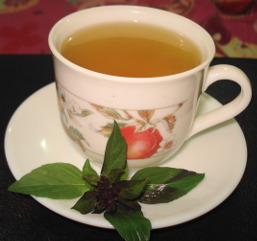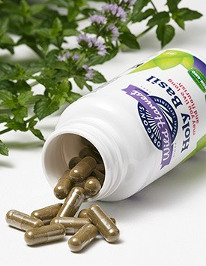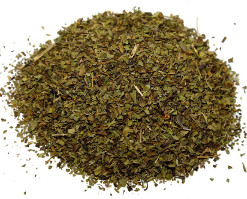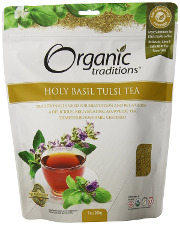 Holy basil has been dubbed the "Queen of Herbs" in India, where the spice originated, and by a multitude of users who herald its natural healing properties. Some folks even refer to holy basil as the "elixir of life", due to its reputation for promoting both longevity and overall physical well-being. The Indian herb is also known as Tulsi. For centuries, holy basil has been used as an ingredient in Indian recipes to treat a vast array of conditions, ranging from ringworm to malaria. Holy basil should not be confused with the Western spice, known simply as "basil".
Holy basil has been dubbed the "Queen of Herbs" in India, where the spice originated, and by a multitude of users who herald its natural healing properties. Some folks even refer to holy basil as the "elixir of life", due to its reputation for promoting both longevity and overall physical well-being. The Indian herb is also known as Tulsi. For centuries, holy basil has been used as an ingredient in Indian recipes to treat a vast array of conditions, ranging from ringworm to malaria. Holy basil should not be confused with the Western spice, known simply as "basil".
Holy basil can cure malaria, a mosquito-borne illness that causes a high fever, lethargy, skin rashes, and nausea. If malaria is detected in its early stages, consuming just a few holy basil leaves has been successful in stopping the disease, the Bioactive Food as Dietary Interventions for Liver and Gastrointestinal Disease (2013) report revealed. Various mixtures of Tulsi and herbs, such as cinchona, have been used to combat and cure malaria for centuries.
Each part of the Tulsi plant can be utilized as part of a natural home apothecary. Despite having a bounty of therapeutic benefits, holy basil is still not recommended by the medical establishment or by regulatory agencies. The Tulsi plant boasts high amounts of calcium, vitamin A, zinc, chlorophyll, vitamin C, and iron.
Most Common Uses of Holy Basil
- The alcohol extract from the Tulsi herb is often ingested to treat eye diseases and stomach ulcers.
- To treat bronchitis, the fresh flowers can be consumed to combat the illness. Due to the slightly bitter taste of the plant, the flowers are often mixed with honey and lemon juice for making a hot tea.
- When mixed with black pepper, holy basil becomes an elixir for malaria patients. The black pepper and holy basil tea reduces, and ultimately eliminates, fever. The healing tea acts as an expectorant, provoking a productive cough in many malaria and dengue fever sufferers.
- The entire herb can be ingested to treat vomiting, diarrhea, and nausea.
Holy Basil Benefits
 Holy basil capsules by Wild Harvest
Holy basil capsules by Wild Harvest
- Stress Prevention and Reduction - The herb enhances mood regulation and helps the body to cope with the anxiety that is caused by emotional, chemical, physical, or infectious stress. It promotes mental balance, meaning that both the body and mind are operating at enhanced capacity to be freer from problems such as depression, anxiety, and other issues which can cause lethargy or a negative impact on overall health.
- Physical Stamina - Ingesting holy basil helps enhance the body's metabolism, improves physical prowess, and mental alertness.
- Cognitive Improvements - Tulsi helps to stave off overall exhaustion, improve one's ability to sleep well, and it decreases forgetfulness. Test subjects who ingested 500 milligrams of Tulsi extract per day revealed that they felt substantially less depressed, less stressed, and they found themselves being more comfortable in social situations, as reported by a study from the Journal of Ayurveda and Integrative Medicine.
- Oxidative Stress - Natural anti-oxidants that are present in holy basil protect the human body from oxidative stress whenever the diet is lacking in antioxidants or the individual is suffering from toxicity problems.
The Journal of Ayurveda study also found Tulsi aids in the prevention of cancer and actually retards the growth of existing cancer cells. The same review also declared Tulsi to be the "pre-eminent" Ayurveda herb. Ayurvedic medicine, or Ayurveda, as it is often shortened, is an ancient whole-body healing and wellness system that was created in India thousands of years ago.
"Tulsi has been found to protect organs and tissues against chemical stress from industrial pollutants and heavy metals, and exposure to cold and excessive noise, counter metabolic stress through normalization of blood glucose, blood pressure and lipid levels, and psychological stress through positive effects on memory and cognitive function and through its anxiolytic and anti-depressant properties."
-- Tulsi - Ocimum sanctum: A herb for all reasons,
Journal of Ayurveda and Integrative Medicine
 Dried and ground holy basil
Dried and ground holy basil
Holy basil also boasts a plethora of anti-bacterial and anti-microbial properties. These characteristics have prompted naturopathic practitioners to utilize Tulsi as an alternative to commercial hand sanitizers, as a water purification agent, as an ingredient in homemade mouthwashes, as a part of their holistic livestock husbandry routine, and as a food preservative.
Leaf extract from the holy basil plant is sometimes used to increase the speed of wound healing. Furthermore, it is used as a natural ingredient in anti-viral, anti-inflammatory, anti-fungal, and painkiller remedies. Tulsi leaf tinctures are often used topically to help protect and heal surgery incision wounds. This natural wonder is also beneficial in the prevention of infections, in the healing of mouth ulcers, in treating acne, and it reduces scar tissue.
Holy Basil Studies
 Health Wyze recommends this brand, which is good for making teas or capsules. It is available at Amazon.
Health Wyze recommends this brand, which is good for making teas or capsules. It is available at Amazon.
- Diabetes - In both human and animal studies, holy basil has been shown to prevent many of the side effects of Type 2 diabetes and it reduces blood sugar levels. Consumption of portions of the entire plant can help diabetes sufferers to control weight gain, reduce hypertension, reduce excessive insulin in the bloodstream, and decrease cholesterol. In a laboratory study involving rats with diabetes, researchers recorded a 24% reduction in blood sugar levels within a single month. The rats were fed leaf powder from the Tulsi plant, a University of Michigan study revealed.
- Weight Loss - A separate and unrelated study involving the benefits of holy basil found that the herb's ability to positively impact metabolic stress often resulted in lowered cholesterol and a weight reduction in rabbits.
- Cholesterol - Oil extracted from the Tulsi plant has been found to decrease cholesterol levels in the hearts, livers, and kidneys of rats.
- Digestion - Holy basil minimizes the secretion of acid-pepsin that causes mucus cell damage in the stomach lining. The herb also enhances the creation of protective mucus cells. One recent study revealed that ingesting 200 milligrams of extract from the Tulsi plant was able to decrease the number and severity of ulcers in at least two-thirds of the animals that were used in the clinical trial. The results of another study titled, Evaluation of anti-ulcerogenic and ulcer-healing properties of Ocimum sanctum linn showed that "Ocimum sanctum" or holy basil, does possess "therapeutic properties."
"We found that OS [holy basil], decreased the incidence of ulcers and also enhanced the healing of ulcers. Additionally, OS completely healed the ulcers within 20 days of treatment. We observed that anti-ulcer effect of OS may be due to its cytoprotective effect rather than antisecretory activity. Conclusively, OS was found to possess potent anti-ulcerogenic as well as ulcer-healing properties and could act as a potent therapeutic agent against peptic ulcer disease."
-- Evaluation of anti-ulcerogenic and ulcer-healing properties of Ocimum sanctum linn, Journal of EthnoPharmacology
Holy Basil Usage
Tulsi is a hardy herb that can easily be organically grown on a windowsill or in a container garden. Holy basil can also be purchased as a supplement at most natural health and herbal supplement stores.
Recommended dosages typically range from 300 milligrams to 2,000 milligrams a day. Whenever Tulsi is being used to treat a specific ailment or condition, it is often ingested in dosages ranging from 600 milligrams to 1,800 milligrams, several times per day.
Tulsi oil can be made by distilling both the flowers and leaves of the plant. To make a simple holy basil tea, steep about three teaspoons (1 Tbsp.) of the herb in boiling water for about five minutes. Flowers, leaves, or dried powder from leaves can be used. The leaves can have a slightly bitter taste, but they are used to make stews, soups, and similar recipes. Honey and lemon can be used to offset the bitter taste, as is the common practice for many other teas.
| Tara Dodrill is a proud conservative Christian woman and homesteader from Appalachia. Dodrill is an author, radio show host, and online journalist with a background in the education and real estate fields. She is a devoted wife, mother, and grandmother who is dedicated to living a self-reliant lifestyle and aiding others along their preparedness journey. |
Sources
Holy Basil, University of Michigan
Tulsi - Ocimum sanctum: A herb for all reasons, Journal of Ayurveda and Integrative Medicine
Bioactive Food as Dietary Interventions for Liver and Gastrointestinal Disease, Science Daily
Evaluation of anti-ulcerogenic and ulcer-healing properties of Ocimum sanctum Linn, Journal of EthnoPharmacology
Evaluation of ethanol leaf extract of Ocimum sanctum in experimental models of anxiety and depression, Journal of Pharmaceutical Biology
The Clinical Efficacy and Safety of Tulsi in Humans: A Systematic Review of the Literature, Evidence-Based Complementary and Alternative Medicine
Related Articles
Quick Tip: Cure Ulcers Naturally With Raw Cabbage Juice
Special Investigative Report: Curing Diabetes Naturally and Holistically
The Big One: Naturally Preventing and Curing Heart Disease
Special Investigative Report: L-tryptophan, Lactic Acid, Prozac and Naturally Treating Depression
The Potent and Natural Painkillers That Are Still Legal
Eliminating the Parasites That You Almost Certainly Have and Curing Lupus